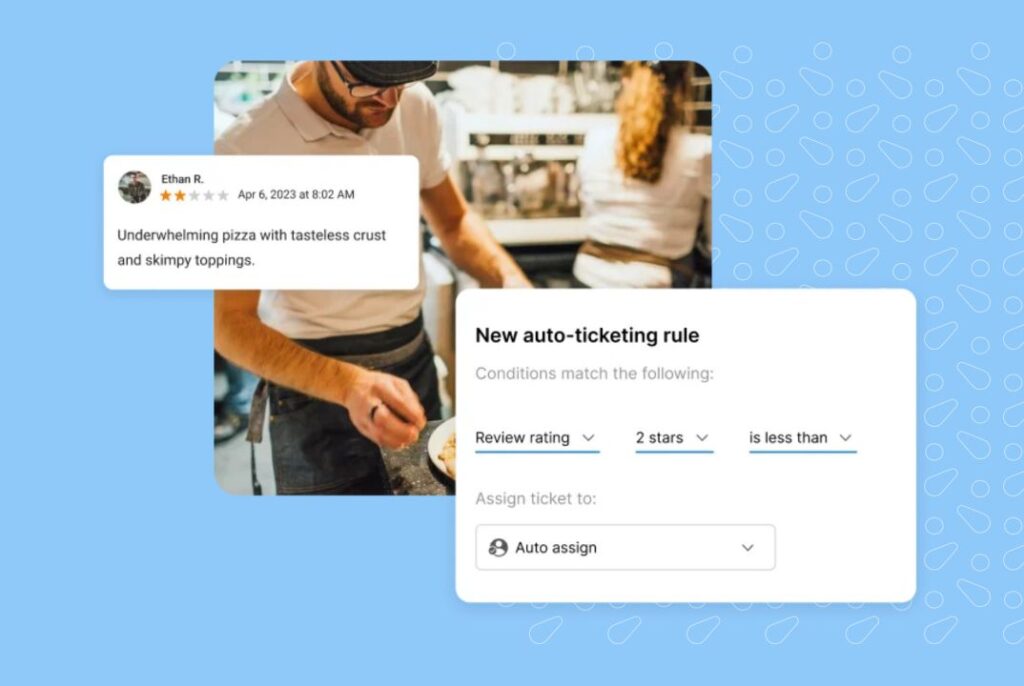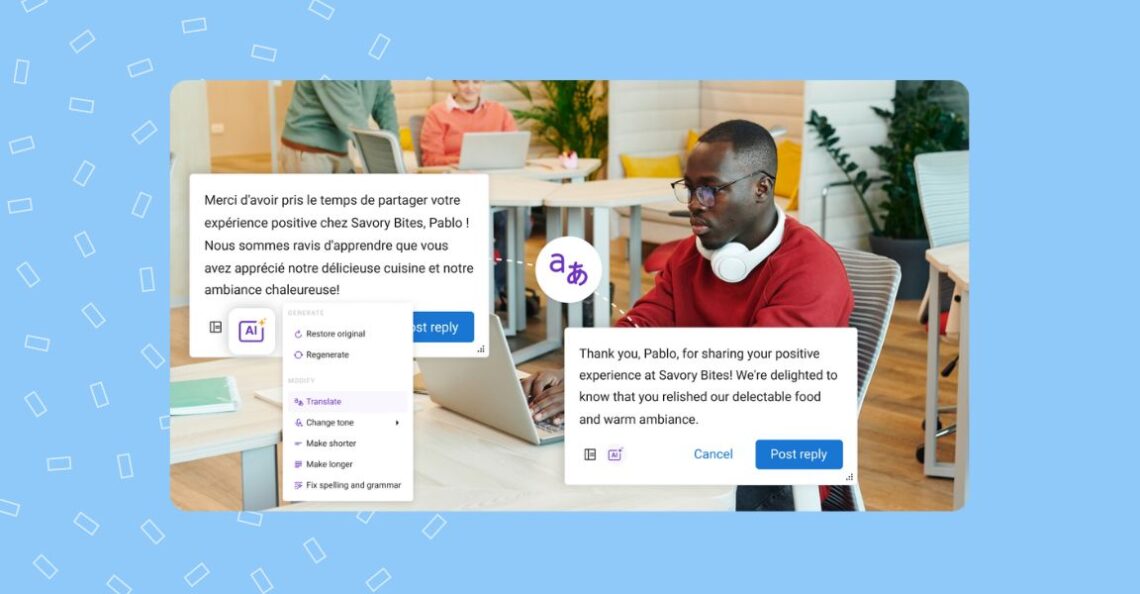Businesses striving to be industry leaders can use AI (Artificial Intelligence) to improve customer experience, thereby becoming their customers’ first choice. While investing in lead generation and audience attraction is crucial, the key to success lies in customer satisfaction.
Delivering outstanding service and positive experiences not only keeps customers happy but also transforms them into a source of new leads.
In fact, a Birdeye study showed that around 25% of marketers list referrals as a top lead-generating source, bringing in new customers. Satisfied customers not only return but also become advocates, attracting more customers to your business.
However, delivering exceptional customer experience is getting harder and harder in the increasingly competitive business landscape.
Table of contents
- What is AI-driven customer experience?
- Why should businesses focus on customer experience?
- What customer experience issues are businesses trying to solve with AI?
- How AI and human-powered customer experiences offer effective solutions
- How to use AI to deliver better customer experience?
- Understand the customer better
- Streamline purchase processes
- Enable 24/7 self-service
- Ensure prompt resolution of issues
- Enable real-time decision making
- Implement omnichannel tracking of conversations for seamless interactions
- Personalize customer experience across channels
- Predict and prevent customer churn
- Everyday use cases where AI can improve customer experiences
- 6 AI-driven real-life customer experience examples
- FAQs about AI for customer experience
- Transform your customer experiences with BirdAI
What is AI-driven customer experience?
AI-driven customer experience models employ artificial intelligence technologies to help businesses provide personalized, seamless, efficient, and improved customer interactions.
With AI-driven solutions, you can bring efficiency across customer touchpoints, increase customer satisfaction, support self-service options, and gain valuable insights to deliver highly tailored and engaging interactions.
The many benefits of this solution also include improving your customer acquisition, conversion, and delight processes.
How generative AI is used for customer experience?
Generative AI options allow businesses to use Artificial Intelligence (AI) in their processes to generate human-sounding texts, audio, graphics, and videos. Many enterprises have also begun incorporating generative AI technologies such as Chat-GPT, Dall-E, Midjourney, or Bard into their processes.
With this, businesses improve and provide personalized customer interaction with the right prompt. However, this technology needs highly insightful data to make a real difference in your customer experience.
You must identify the right AI-driven solutions to impact significant customer experience processes for the best results. But even before you do that, you should identify the right workflows where you can implement AI to get maximum results.
Why should businesses focus on customer experience?
Customers with a positive experience grow into becoming advocates and loyal supporters of a business. A business’s ability to provide a positive customer experience directly impacts its branding, online reputation, and growth efforts.
Before we delve into how AI can help improve customer experience, let’s understand the impact of positive customer experience:
- Businesses that prioritize good customer experience have a higher customer retention rate. A recent Birdeye study shows that over 60% of customers switch to competitors after a single bad customer experience.
- Positive customer experiences allow enterprises to charge premium rates for their products and services. (e.g. Apple)
- High-quality customer experience helps businesses grow loyalty programs and referral campaigns, lowering customer acquisition and retention spending (e.g. Trader Joe’s). Our research shows that 77% consumers tell their family and friends about a business that delivered a positive customer experience, while 74% agreed that they would buy from such a business again.
Birdeye – all-in-one platform
Automate Reviews, Ratings, Listings & Reputation Management with Birdeye.
What customer experience issues are businesses trying to solve with AI?
Some of the significant challenges that businesses are looking to solve with Artificial Intelligence (AI) solutions include:
- Manage high customer expectations: Consumers expect quick and exceptional experiences when interacting with businesses. But, local businesses lack the tools to compete with more prominent brands. Today, customers use four or more channels to interact with brands – texts, emails, social media messages, website chatbots, and booking apps. And businesses often end up overwhelmed, making the customer experience suffer.
- Grow with limited resources: Service businesses operate with lean teams with a single employee handling more than one function. They want to deliver delightful, personalized customer experiences, but most businesses don’t have the resources to do so at scale. This makes growth and customer delight challenging.
- Information overload: Businesses need precise, valuable, actionable insights from customer feedback, surveys, and reviews. But, high volumes of data are hard to analyze without the right tools, time, or awareness.
- Personalized customer experiences: The need to provide unique, personalized, and carefully curated experiences is constantly rising, especially for local businesses competing with more prominent brands. However, businesses need rich data to offer these experiences, which can be challenging to acquire. Birdeye research shows that 63% of multi-location marketers use SMS daily to communicate with customers, however, only 28% of them can personalize the messages. The catch is that businesses need rich data, resources, and investment to offer these experiences, which can be challenging to acquire.
How AI and human-powered customer experiences offer effective solutions
Human skills, training, and knowledge have been the key drivers for providing great customer experiences. With the entry of AI-powered customer experience, the industry is significantly taking a pivot. Both these approaches have their advantages and limitations when used separately.
However, businesses can offer effective solutions to their customers by combining the best of human and AI-driven solutions. Human-controlled AI solutions can ensure:
Improved customer interaction availability
In human-driven customer experience, the availability of working hours and personnel to cover shifts limit customer interactions. However, you can offer 24×7 availability with instant support and customer self-service models by combining the capacity of human agents with AI-driven solutions.
AI-driven solutions can supplement existing human agents and help enterprises make up for any unavailability at certain times. This also helps businesses scale across time zones without hiring additional staff.
Personalization
The extent of personalization in AI-driven customer experience depends on your team’s skills and knowledge, but this can be handled by adding AI-powered capabilities to your team.
AI-driven customer experience teams provide highly personalized experiences made possible by vast data analysis and machine learning.
Faster scalability
Local businesses face limitations in scaling human-driven operations due to a lack of skilled personnel, additional costs, and other constraints. However, with AI-driven solutions, businesses can scale faster at minimal costs.
AI-powered solutions help businesses interact with customers across different locations, languages, and demographics. The in-built translation and personalized customer interaction ability make this possible.
Response time
Artificial Intelligence (AI)-driven tools help businesses deliver real-time customized responses and significantly minimize customer wait times when human agents are overloaded with other issues.
Did you know that 61% of customers would choose a business that responds to messages within a day?
Improved emotional understanding
Human agents can empathize with customers and understand their emotional state during interactions. AI-driven tools, however, can run sentiment analysis but have difficulty genuinely understanding emotions and displaying empathy to customers. This can significantly hamper customer satisfaction.
Businesses can overcome these issues by having human agents oversee AI-written responses and deliver empathetic responses.
Continuous learning
AI-driven tools can instantly learn and improve their service over time, while human agents need investment-intensive training programs. Businesses can develop cost-effective training programs by equipping the insights from AI solutions to train human agents.
Consistency
AI-driven tools can always provide a consistent customer experience as they are void of biases and can avoid human errors. This helps businesses improve customer satisfaction and build a stronger brand.
Complex issue handling
AI-driven solutions can handle routine tasks and answer questions from FAQ sets and simple inquiries. But, businesses must make sure that they have human agents that can handle complex problems and unique situations.
As you can see, implementing a hybrid Human-Artificial Intelligence(AI) model has many significant advantages. This model can leverage the benefits of AI-driven customer experience solutions and allows businesses to retain the human touch with the final say.
How to use AI to deliver better customer experience?
Businesses can use Artificial Intelligence (AI) to deliver better customer experience with sentiment analysis, process improvement, 24/7 self-service programs, customer feedback analysis, and more.
With AI-driven customer experience solutions, businesses can:
- Understand customers better
- Streamline purchase processes
- Enable 24/7 self-service
- Ensure prompt resolution of issues
- Enable real-time decision-making
- Implement omnichannel tracking of conversations for seamless interactions
- Personalize customer interactions
- Predict and prevent customer churn
- Reduce human errors
- Grow your business with lean teams
Understand the customer better
Customers like to be heard and expect businesses to deliver products, services, and interactions explicitly tailored to them. While this is a big ask for any local business, Artificial Intelligence (AI) can make this possible at scale.
Artificial Intelligence (AI) can help businesses gain keen insights into their customer base by analyzing vast amounts of customer data to understand:
- Customer behavior patterns
- Customer sentiments from reviews, survey responses, and message interactions.
- The typical customer journey to tailor interactions accordingly.
A great example of using AI to better understand customers is the way National Storage Affiliates leveraged Birdeye’s AI insights to understand customer sentiment and find improvement opportunities. Their SVP of customer acquisition, Melissa Cameron, highlighted at Birdeye’s user conference how AI in customer feedback analysis has helped them understand customers and evaluate performance immensely.
Streamline purchase processes
Previously, we saw that customers have high expectations from businesses. This includes providing a seamless and consistent experience at all times. Implementing Artificial Intelligence (AI) for customer experience can help businesses:
- Analyze past purchase processes
- Identify issues
- Provide solutions to customers if they get stuck while completing a transaction
- Provide feedback to avoid the recurrence of the issue
Enable 24/7 self-service
Customer service teams often encounter the 80/20 rule, such that 80% of customers are on the same 20% of issues. This is an opportunity to manage resources well by incorporating Artificial Intelligence (AI) for a growing multi-location enterprise business.
Businesses can implement AI-driven customer service tools that help customers to solve these issues without a human agent. You can equip chatbots with pre-written FAQs, purchase processes, payment method issues, etc. This way, businesses can resolve most issues without customer service team intervention.
Enabling 24/7 self-service also improves customer satisfaction, as easy access to information can resolve issues without depending on anyone.
“Through Webchat, clients are able to get quick information either through the automated AI bot Robin or our agents without searching pages on our website. Having a tool like Webchat where we can serve clients right away and get them information they need, helps jumpstart processes.”
Steven Greer, COO- Genesis Counseling
Ensure prompt resolution of issues
The faster you resolve a customer issue, the happier the customer is. Every business knows this, but often it requires issue escalation and a lot of complaints for the issue to attain resolution.
Businesses can significantly reduce resolution times using Artificial Intelligence (AI) to improve customer experience. AI solutions in customer experience can:
- Monitor all incoming support tickets and categorize them according to priority. Based on the content and frequency of complaints, the system can escalate issues sooner for a quick resolution.
- Respond instantly to customers connecting to businesses via texting, social media messages, or AI chatbots to reduce wait times.
- Provide comprehensive reports on recurring issues to help businesses solve the core issue and improve customer experience.

Enable real-time decision making
We know AI can analyze vast amounts of data in real-time and provide insights instantly. So, Artificial Intelligence (AI) solutions can help businesses drive actions based on actions taken by a customer in an interaction. This ability can help businesses enable real-time decision-making and provide a hyper-personalized experience to customers.
For example, you can make sure that a particular response is sent out based on the options selected by the customer or that a specific page loads upon a particular customer interaction.
You can use AI to predict future customer behavior, implement content, and process changes to improve customer experience.
Implement omnichannel tracking of conversations for seamless interactions
Businesses and customers have 3 to 4 touchpoints for interactions in a typical customer journey. These include channels like SMS, surveys, reviews, website chatbots, and social media message inboxes.
Businesses can use AI solutions to boost customer experience by tracking conversations across all channels while responding to their queries. If a human agent needs to step in, this summary will also be available to them to assist the customers.
Personalize customer experience across channels
Customers expect their customer service team to be aware of all previous interactions and assist them. This is irrespective of the interaction channel they are currently using.
Artificial Intelligence (AI) can track previous customer interactions, purchase history, store visits, social media messages, and more. This helps businesses provide a personalized customer experience to customers across all channels.
Businesses would be able to provide consistency in brand interactions with this approach.
“Simplifying client communication through a focused, integrated inbox and leveraging AI brings more efficiencies and effectiveness in a business.”
Steven Greer, COO of Genesis Counseling Center
Predict and prevent customer churn
Businesses must always aim to improve customer retention. But, it is difficult to predict what makes a customer discontinue or unsubscribe from a service. However, businesses use AI-driven solutions to monitor customer experience across channels. This helps them predict future customer behavior and implement steps to prevent customer churn.
The data from AI insights may and has sometimes influenced our rate increase strategy adjustments. It really helps to shed some light on what maybe our machine learning might have missed in terms of the risk of churn.
Melissa Cameron, SVP of customer acquisition, National Storage Affiliates
Everyday use cases where AI can improve customer experiences
Artificial Intelligence (AI) helps businesses improve customer experiences by implementing solutions across social media, online reputation, conversation bots, customer communication, feedback channels, and SEO.
Here are a few ways businesses can leverage AI to improve customer experience:
Social media management
AI-powered social media management solutions like Birdeye can help you:
- Auto-create posts with simple prompts
- Add images from a portfolio of stock images according to your content
- Create posts for preset occasions such as holidays
- Create industry-specific and relevant content by providing post ideas
- Generate engaging posts and add relevant hashtags to help them reach your target audience
- Edit content according to brand tone and elevate their engagement
- Create and pre-set custom prompts to accelerate your social media growth
Read our detailed article on how AI can help improve customer experience via social media management to know more.
Reputation management
For enterprises looking to elevate their reputation management and grow a solid online presence, AI-driven reputation management tools can help:
- Auto-generate personalized review responses based on the context
- Rephrase review responses to articulate thoughts better with a simple click
- Ensure all communication is free of grammatical or spelling errors
- Analyze customer sentiment from the review/feedback and provide summaries to help businesses take appropriate actions
- Understand customer sentiment without language barriers with translating capabilities. Tools like BirdAI can help respond to customer reviews in the original language to foster stronger connections.
Read our detailed blog post on how AI can streamline reputation management and improve customer experience to know more.
Improve conversion rates
Businesses need to meet and assist customers where they are to improve their lead conversion rates. Any drop in service in the buyer’s journey can profoundly impact the buyer’s intent to convert. Avoid these scenarios and use AI-driven customer experience solutions like BirdAI to
- Become an “always-on” service and provide 24×7 service availability to customers.
- Improve sales processes and conversion rates by analyzing customer conversations for better lead-scoring results.
- Scale customer service faster with pre-written answer sets and AI responses
- Save on cost and time in building a customer support team when building the business from the ground up.
- Scale across locations by unifying customer support with AI-driven chatbots.
Real-time engagement and omnichannel support
AI-driven customer experience tools can help businesses engage with customers across multiple channels without hampering consistency or creating communication gaps.
AI can help:
- Respond to customers in real time to solve their queries instantly
- Analyze customer conversations and provide accurate responses
- Improve customer service response times and enable faster conversions. Ensure a seamless experience across various communication channels.
- Craft consistent brand responses with real-time rephrasing and editing capabilities
- Improve efficiency in customer support interactions
- Summarize previous conversations in case a human agent takes over the interaction
- Create a unified inbox to monitor all customer conversations from a single dashboard
Learn more about improving customer feedback management with AI-driven solutions with our detailed blog post.
Customer feedback analysis
The best way to keep customers happy is to show that you value their feedback. Proactively collecting customer feedback and implementing corresponding changes helps improve customer satisfaction and keeps the customers invested in the brand.
With AI, enterprises can:
- Process and analyze vast amounts of data collected from customer feedback channels and identity sentiment, trends, preferences, and potential issues.
- Gain insights from data collected across channels such as reviews, surveys, and social media mentions to understand overall customer feedback trends
- Generate summaries for survey responses to understand the core issues quickly
Related read: Our detailed blog post on gaining actionable insights from customer feedback with AI-driven solutions.
Boost SEO performance with AI
Local search is challenging for many enterprises, especially those operating from multiple locations. Businesses must maintain listings and provide accurate and engaging descriptions so customers can discover them sooner. Studies show that 61% of customers only select the first three businesses they see in a Google search. This makes it very important for local businesses to leverage AI and secure those positions.
Here’s how AI can help you improve your SEO performance:
- Optimizing business listing descriptions to rank higher in local searches. Businesses can generate SEO-friendly descriptions for Google Business Profiles to attract customers, rank higher, and maintain consistency across locations.
- Generate local keywords that businesses must target to rank higher in search results.
- Create SEO-friendly content based on keywords and prompts from the business.
- Optimize content to rank for featured snippets, FAQs, and other SEO-friendly results.
- Generate content ideas based on search intent, competitor performance, and related input.
6 AI-driven real-life customer experience examples
AI-driven customer experience is a new avenue for many businesses. But, some brands have already been implementing these solutions in their customer experience processes. This section covers some of the top AI-driven customer experience examples to understand how you can do it, too.
Birdeye
Birdeye is an award-winning customer experience platform. It provides solutions for multi-location enterprise businesses to attract customers, convert them faster, engage them with higher-quality conversation tools, and grow them into referrals.
To make sure that their customers are happy and satisfied across all interactions, Birdeye has developed an AI and NLP engine. This ensures that Birdeye customers can manage customer experience and online reputation management at scale with the best insights possible.
Birdeye uses Artificial Intelligence to:
- Gain insights on customer experience and tailor products according to customer pain points
- Collect customer feedback with intuitive surveys
- Make sure all business reviews have been responded to promptly
- Enable 24/7 availability with off-hour AI-driven solutions to supplement human customer service agents.
Know more about Birdeye’s AI capabilities here.
Amazon
The retail giant Amazon has always aimed to provide the best customer experience possible to all its customers. So, it is natural that Amazon uses Artificial Intelligence (AI) across various customer touchpoints to provide better support and quality customer interaction.
- Amazon uses AI to solve a majority of customer queries without human agents. And for the handful of queries that reach the agents, Amazon leverages AI capabilities to help solve them faster.
- The platform also provides personalized recommendations to shoppers by analyzing their browsing and purchase history.
- Amazon has also improved auto-complete quality in its searches with customized and relevant suggestions based on previous searches.
Starbucks
A significant chunk of Starbucks’ revenue comes from customers using its mobile apps and connected loyalty programs. So, the company must provide a superior customer experience on this platform and keep the customers hooked to the app.
To achieve this, Starbucks leverages AI-driven customer experience models to provide:
- Personalized product recommendations on the App based on previous order history
- Targeted ads to customers based on demographics, behavior, and social media activity
- Optimal wait times in store for online order pickups by communicating accurate data based on store traffic data
- Updates on nearby Starbucks outlets or new product launches that customers may like
Netflix
It isn’t a coincidence that there is always no end to the shows you like on Netflix. What it is, is a carefully executed AI-driven customer experience from the streaming company.
Netflix leverages Artificial Intelligence (AI) to power its content recommendation engine and provide insights based on the following:
- Users viewing habits
- Preferences on movie and TV show genres
This ensures that customers always see content that would keep them engaged and invested in the platform.
Tesla
Tesla has been at the forefront of innovation across many verticals. But, its commitment to using AI to enhance customer experience is one of the best in the industry. The company uses Artificial Intelligence (AI) to improve customer experience across many different aspects by creating:
- Driver profiles that record the optimal position of the seat, mirror, and the wheel
- A customized driving experience for each of its customers by analyzing their driving needs, patterns, and more
- A dynamic dashboard that updates the controls and features based on driver profiles
Bank of America
The customer support team in the banking industry handles many sensitive issues that need a personalized touch and a faster response time. To make this a possibility, Bank of America has implemented an AI-powered chatbot, Erica, that assists customers. Customers can also interact with a human agent if necessary, as the company has integrated a human touch into its solutions.
Bank of America also uses Artificial Intelligence (AI) to understand customer behavior patterns to predict/detect data fraud and ensure security for all its customers.
Burger King
The fast-food giant has always been a step behind McDonald’s in capturing the market share, but this may not be the case soon. Burger King has now turned to leveraging AI-driven solutions to enhance customer experience at its outlets to improve customer retention and brand loyalty.
The brand has launched a premier app that allows them to collect customer feedback, understand customer journeys, and create tailored experiences for each customer. With personalized coupons, discount offers, video content, and recommended products, Burger King has now developed a way to connect with customers closely.
The brand has significantly improved foot traffic in its stores and aims to develop new products by leveraging AI-backed customer data to drive its business decisions.
FAQs about AI for customer experience
Businesses can use Artificial Intelligence (AI) in customer service via chatbots, virtual assistants, voice recognition, face recognition, and natural language processing.
Artificial Intelligence (AI) will improve customer experience by allowing businesses to analyze customer data, gain insights into potential opportunities and issues, and understand customer behavior to tailor solutions.
Artificial Intelligence (AI) can improve customer experience by providing personalized recommendations, enabling 24/7 self-service, reducing response times, and streamlining customer conversations across channels.
Transform your customer experiences with BirdAI
Artificial Intelligence (AI) is the solution for businesses looking to compete with the giants in the industry by providing excellent customer experiences. AI-driven solutions can help you build personalized, intelligent, scalable customer experiences without straining your resources.
With BirdAI, you can leverage Artificial Intelligence (AI) in social media management, reputation management, omnichannel support for customer conversations, business listing management, feedback analysis, and more.

Originally published









